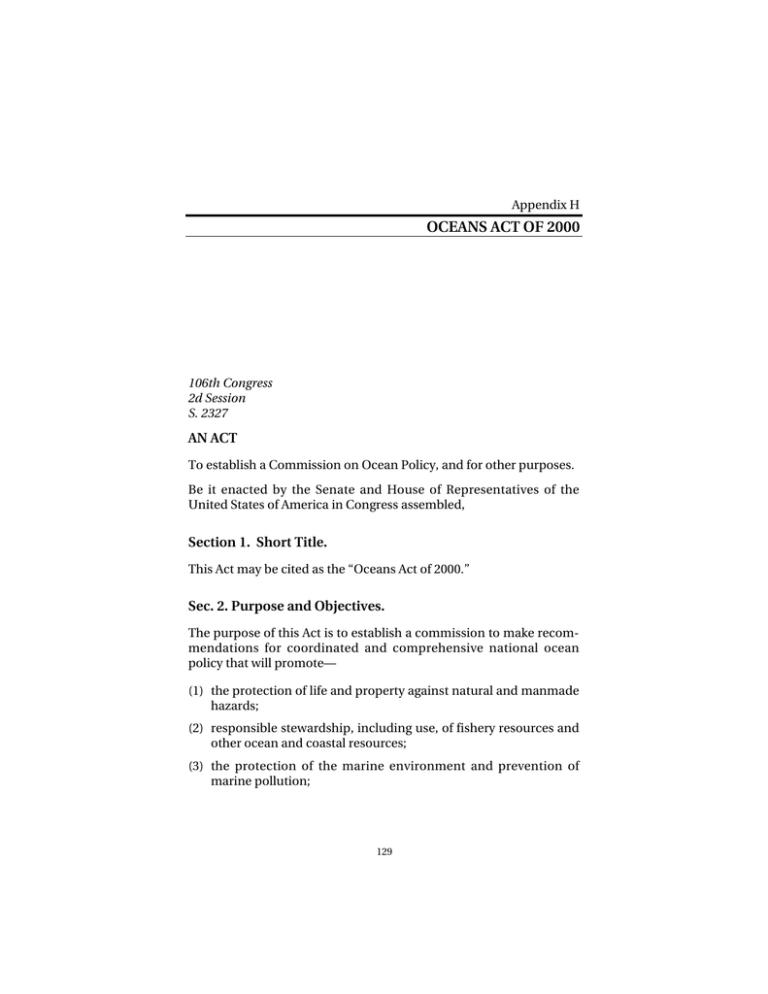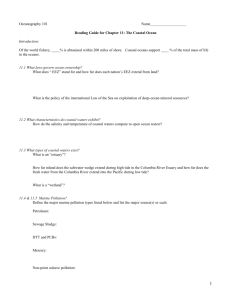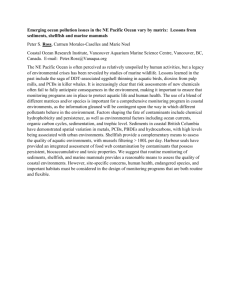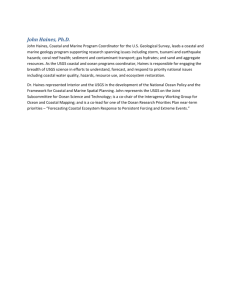OCEANS ACT OF 2000 AN ACT
advertisement

Appendix H OCEANS ACT OF 2000 106th Congress 2d Session S. 2327 AN ACT To establish a Commission on Ocean Policy, and for other purposes. Be it enacted by the Senate and House of Representatives of the United States of America in Congress assembled, Section 1. Short Title. This Act may be cited as the “Oceans Act of 2000.” Sec. 2. Purpose and Objectives. The purpose of this Act is to establish a commission to make recommendations for coordinated and comprehensive national ocean policy that will promote— (1) the protection of life and property against natural and manmade hazards; (2) responsible stewardship, including use, of fishery resources and other ocean and coastal resources; (3) the protection of the marine environment and prevention of marine pollution; 129 130 A Concept of Operations for a New Deep-Diving Submarine (4) the enhancement of marine-related commerce and transportation, the resolution of conflicts among users of the marine environment, and the engagement of the private sector in innovative approaches for sustainable use of living marine resources and responsible use of nonliving marine resources; (5) the expansion of human knowledge of the marine environment including the role of the oceans in climate and global environmental change and the advancement of education and training in fields related to ocean and coastal activities; (6) the continued investment in and development and improvement of the capabilities, performance, use, and efficiency of technologies for use in ocean and coastal activities, including investments and technologies designed to promote national energy and food security; (7) close cooperation among all government agencies and departments and the private sector to ensure— (A) coherent and consistent regulation and management of ocean and coastal activities; (B) availability and appropriate allocation of Federal funding, personnel, facilities, and equipment for such activities; (C) cost-effective and efficient operation of Federal departments, agencies, and programs involved in ocean and coastal activities; and (D) enhancement of partnerships with State and local governments with respect to ocean and coastal activities, including the management of ocean and coastal resources and identification of appropriate opportunities for policy-making and decision-making at the State and local level; and (8) the preservation of the role of the United States as a leader in ocean and coastal activities, and, when it is in the national interest, the cooperation by the United States with other nations and international organizations in ocean and coastal activities. Oceans Act of 2000 131 Sec. 3. Commission on Ocean Policy. (a) ESTABLISHMENT—There is hereby established the Commission on Ocean Policy. The Federal Advisory Committee Act (5 U.S.C. App.), except for chapters 3, 7, and 12, does not apply to the Commission. (b) MEMBERSHIP— (1) APPOINTMENT—The Commission shall be composed of 16 members appointed by the President from among individuals described in paragraph (2) who are knowledgeable in ocean and coastal activities, including individuals representing State and local governments, ocean-related industries, academic and technical institutions, and public interest organizations involved with scientific, regulatory, economic, and environmental ocean and coastal activities. The membership of the Commission shall be balanced by area of expertise and balanced geographically to the extent consistent with maintaining the highest level of expertise on the Commission. (2) NOMINATIONS—The President shall appoint the members of the Commission, within 90 days after the effective date of this Act, including individuals nominated as follows: (A) 4 members shall be appointed from a list of 8 individuals who shall be nominated by the Majority Leader of the Senate in consultation with the Chairman of the Senate Committee on Commerce, Science, and Transportation. (B) 4 members shall be appointed from a list of 8 individuals who shall be nominated by the Speaker of the House of Representatives in consultation with the Chairmen of the House Committees on Resources, Transportation and Infrastructure, and Science. (C) 2 members shall be appointed from a list of 4 individuals who shall be nominated by the Minority Leader of the Senate in consultation with the Ranking Member of the Senate Committee on Commerce, Science, and Transportation. (D) 2 members shall be appointed from a list of 4 individuals who shall be nominated by the Minority Leader of the 132 A Concept of Operations for a New Deep-Diving Submarine House in consultation with the Ranking Members of the House Committees on Resources, Transportation and Infrastructure, and Science. (3) CHAIRMAN—The Commission shall select a Chairman from among its members. The Chairman of the Commission shall be responsible for— (A) the assignment of duties and responsibilities among staff personnel and their continuing supervision; and (B) the use and expenditure of funds available to the Commission. (4) VACANCIES—Any vacancy on the Commission shall be filled in the same manner as the original incumbent was appointed. (c) RESOURCES—In carrying out its functions under this chapter, the Commission— (1) is authorized to secure directly from any Federal agency or department any information it deems necessary to carry out its functions under this Act, and each such agency or department is authorized to cooperate with the Commission and, to the extent permitted by law, to furnish such information (other than information described in chapter 552(b)(1)(A) of title 5, United States Code) to the Commission, upon the request of the Commission; (2) may enter into contracts, subject to the availability of appropriations for contracting, and employ such staff experts and consultants as may be necessary to carry out the duties of the Commission, as provided by chapter 3109 of title 5, United States Code; and (3) in consultation with the Ocean Studies Board of the National Research Council of the National Academy of Sciences, shall establish a multidisciplinary science advisory panel of experts in the sciences of living and nonliving marine resources to assist the Commission in preparing its report, including ensuring that the scientific information considered by the Commission is based on the best scientific information available. (d) STAFFING—The Chairman of the Commission may, without regard to the civil service laws and regulations, appoint and termi- Oceans Act of 2000 133 nate an Executive Director and such other additional personnel as may be necessary for the Commission to perform its duties. The Executive Director shall be compensated at a rate not to exceed the rate payable for Level V of the Executive Schedule under chapter 5136 of title 5, United States Code. The employment and termination of an Executive Director shall be subject to confirmation by a majority of the members of the Commission. (e) MEETINGS— (1) ADMINISTRATION—All meetings of the Commission shall be open to the public, except that a meeting or any portion of it may be closed to the public if it concerns matters or information described in chapter 552b(c) of title 5, United States Code. Interested persons shall be permitted to appear at open meetings and present oral or written statements on the subject matter of the meeting. The Commission may administer oaths or affirmations to any person appearing before it: (A) All open meetings of the Commission shall be preceded by timely public notice in the Federal Register of the time, place, and subject of the meeting. (B) Minutes of each meeting shall be kept and shall contain a record of the people present, a description of the discussion that occurred, and copies of all statements filed. Subject to chapter 552 of title 5, United States Code, the minutes and records of all meetings and other documents that were made available to or prepared for the Commission shall be available for public inspection and copying at a single location in the offices of the Commission. (2) INITIAL MEETING—The Commission shall hold its first meeting within 30 days after all 16 members have been appointed. (3) REQUIRED PUBLIC MEETINGS—The Commission shall hold at least one public meeting in Alaska and each of the following regions of the United States: (A) The Northeast (including the Great Lakes). (B) The Southeast (including the Caribbean). 134 A Concept of Operations for a New Deep-Diving Submarine (C) The Southwest (including Hawaii and the Pacific Territories). (D) The Northwest. (E) The Gulf of Mexico. (f) REPORT— (1) IN GENERAL—Within 18 months after the establishment of the Commission, the Commission shall submit to Congress and the President a final report of its findings and recommendations regarding United States ocean policy. (2) REQUIRED MATTER—The final report of the Commission shall include the following assessment, reviews, and recommendations: (A) An assessment of existing and planned facilities associated with ocean and coastal activities including human resources, vessels, computers, satellites, and other appropriate platforms and technologies. (B) A review of existing and planned ocean and coastal activities of Federal entities, recommendations for changes in such activities necessary to improve efficiency and effectiveness and to reduce duplication of Federal efforts. (C) A review of the cumulative effect of Federal laws and regulations on United States ocean and coastal activities and resources and an examination of those laws and regulations for inconsistencies and contradictions that might adversely affect those ocean and coastal activities and resources, and recommendations for resolving such inconsistencies to the extent practicable. Such review shall also consider conflicts with State ocean and coastal management regimes. (D) A review of the known and anticipated supply of, and demand for, ocean and coastal resources of the United States. (E) A review of and recommendations concerning the relationship between Federal, State, and local governments and the private sector in planning and carrying out ocean and coastal activities. Oceans Act of 2000 135 (F) A review of opportunities for the development of or investment in new products, technologies, or markets related to ocean and coastal activities. (G) A review of previous and ongoing State and Federal efforts to enhance the effectiveness and integration of ocean and coastal activities. (H) Recommendations for any modifications to United States laws, regulations, and the administrative structure of Executive agencies, necessary to improve the understanding, management, conservation, and use of, and access to, ocean and coastal resources. (I) A review of the effectiveness and adequacy of existing Federal interagency ocean policy coordination mechanisms, and recommendations for changing or improving the effectiveness of such mechanisms necessary to respond to or implement the recommendations of the Commission. (3) CONSIDERATION OF FACTORS—In making its assessment and reviews and developing its recommendations, the Commission shall give equal consideration to environmental, technical feasibility, economic, and scientific factors. (4) LIMITATIONS—The recommendations of the Commission shall not be specific to the lands and waters within a single State. (g) PUBLIC AND COASTAL STATE REVIEW— (1) NOTICE—Before submitting the final report to the Congress, the Commission shall— (A) publish in the Federal Register a notice that a draft report is available for public review; and (B) provide a copy of the draft report to the Governor of each coastal State, the Committees on Resources, Transportation and Infrastructure, and Science of the House of Representatives, and the Committee on Commerce, Science, and Transportation of the Senate. (2) INCLUSION OF GOVERNORS’ COMMENTS—The Commission shall include in the final report comments received from the 136 A Concept of Operations for a New Deep-Diving Submarine Governor of a coastal State regarding recommendations in the draft report. (h) ADMINISTRATIVE PROCEDURE FOR REPORT AND REVIEW— chapter 5 and chapter 7 of title 5, United States Code, do not apply to the preparation, review, or submission of the report required by subchapter (e) or the review of that report under subchapter (f). (i) TERMINATION—The Commission shall cease to exist 30 days after the date on which it submits its final report. (j) AUTHORIZATION OF APPROPRIATIONS—There are authorized to be appropriated to carry out this chapter a total of $6,000,000 for the 3-fiscal-year period beginning with fiscal year 2001, such sums to remain available until expended. Sec. 4. National Ocean Policy. (a) NATIONAL OCEAN POLICY—Within 120 days after receiving and considering the report and recommendations of the Commission under chapter 3, the President shall submit to Congress a statement of proposals to implement or respond to the Commission’s recommendations for a coordinated, comprehensive, and long-range national policy for the responsible use and stewardship of ocean and coastal resources for the benefit of the United States. Nothing in this Act authorizes the President to take any administrative or regulatory action regarding ocean or coastal policy, or to implement a reorganization plan, not otherwise authorized by law in effect at the time of such action. (b) COOPERATION AND CONSULTATION—In the process of developing proposals for submission under subchapter (a), the President shall consult with State and local governments and non-Federal organizations and individuals involved in ocean and coastal activities. Sec. 5. Biennial Report. Beginning in September, 2001, the President shall transmit to the Congress biennially a report that includes a detailed listing of all existing Federal programs related to ocean and coastal activities, Oceans Act of 2000 137 including a description of each program, the current funding for the program, linkages to other Federal programs, and a projection of the funding level for the program for each of the next 5 fiscal years beginning after the report is submitted. Sec. 6. Definitions. In this Act: (1) MARINE ENVIRONMENT—The term “marine environment” includes— (A) the oceans, including coastal and offshore waters; (B) the continental shelf; and (C) the Great Lakes. (2) OCEAN AND COASTAL RESOURCE—The term “ocean and coastal resource” means any living or non-living natural, historic, or cultural resource found in the marine environment. (3) COMMISSION—The term “Commission” means the Commission on Ocean Policy established by chapter 3. Sec. 7. Effective Date. This Act shall become effective on January 20, 2001. Passed in the Senate June 6, 2000.






